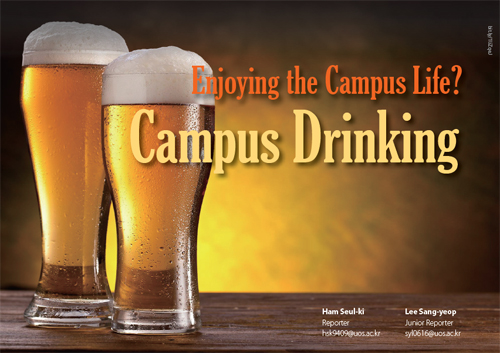
It might also be an optimal place where students who have a light purse can enjoy a humble feast. For the students, consequently, the university campus is a good place to build up relationships with each other and it can hold some unique meanings and memories.
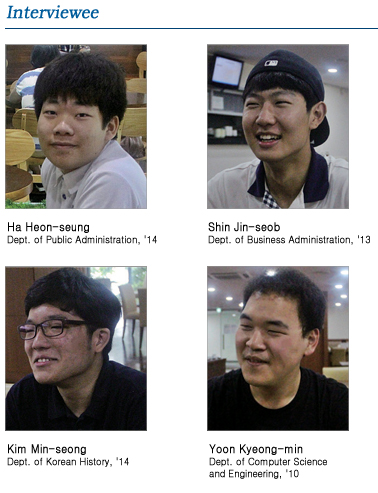
Do you remember the movement last year towards “a festival without alcoholic drinks,” leading to the casting of a vote by the Student Council? Besides the University of Seoul (UOS), a number of universities in Korea were also in a grip of the campaign, and some finally carried out a reformation of the traditional alcoholic festivals. This proposal was rejected at UOS according to the result of the vote: at the Student General Assembly, only 110 students out of 915 were in favor of nonalcoholic festival. However, the question of whether to allow drinking or not has become a pressing matter again with the forthcoming UOS festival, Bibigo. On top of this momentous time, the Ministry of Health and Welfare (henceforth MW) announced that they plan to propose a bill “prohibiting the drinking of alcohol” in public places, including “universities.” With the issue of campus drinking rising to the surface again, it is time to look into both the positive and negative sides of the issue from UOS students’ point of views.
As we noted above, the bill, which is being prepared by MW and will be publicized sooner or later, restricts drinking alcohol at universities by classifying them as public places. In 2012, attempts to limit drinking on university campuses failed once before because of related initiatives’ improper contents, which lacked preparation. This proposal was nullified with no legal effect, but many objections were raised against the potential banning of alcohol on university campuses. When the newly revised bill of 2014 was proposed again in June with the same intention, it was expected that many different voices on this controversial issue would be aroused again.
Especially because UOS is publicly-funded, its responsibility towards this issue might be bigger than that of others, and as our festival Bibigo is coming up, the issue of drinking has come into focus again. In this social atmosphere, what do UOS students think about drinking in campus? We want to hear and share the voices of students regarding the subject of alcohol consumption on school grounds.
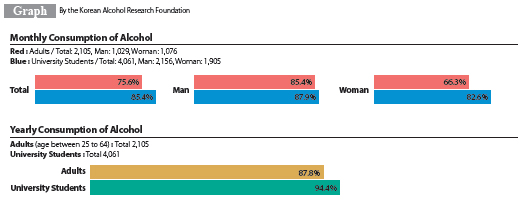
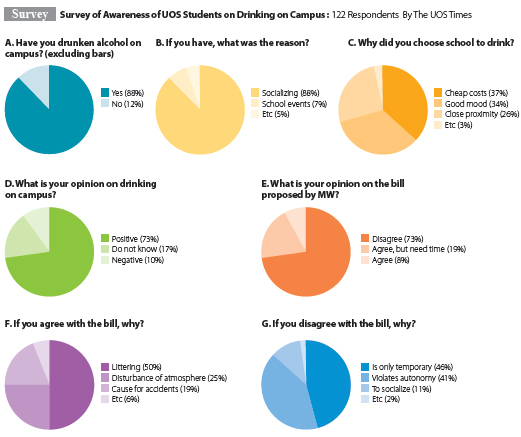
Campus Drinking as a University Culture
University students in Korea are quite accustomed to drinking. According to the Survey of Drinking Culture on 300 Korean university students by Daehaknaeil Research Laboratory for the Twenties (20slab), students drink an average of 4.4 times per month, which means that they drink at least once a week. Then, how much do they drink? According to research conducted by the Korean Alcohol Research Foundation (KARF), alcohol consumption is higher among university students than adults on both yearly and monthly basis. Looking at Graph on the next page, the university students group shows the highest consumption per month among both sexes. In yearly consumption, the student group is also about 6.6 percent higher than the adult group.
As revealed by these studies, many Korean students enjoy drinking culture. On the contrary to those students’ tendency, many universities have shown a prohibitive action towards drinking during the festivals. Dong-A University held a festival enjoyed with local residents which banned alcoholic drinks on campus under the slogan “developing healthy cultures of universities without alcohol” last year. There were some students who opposed this movement; however, the Dong-A Student Council consistently persuaded them and finally succeeded in holding the non-alcoholic festival. Instead of pubs, there were games like “Love Actually,” a cooking competition between students living apart from their families, an E-Sports match, a Food Fighter game, and so on. Dankook University also decided to remove alcoholic drinks during its last festival.
They replaced the bar with some booths divided into academic, cultural, and new experience sections. Departments and clubs at the university were financially aided by the school to plan and participate in a more original festival, instead of just going to bars.
Last year, as previously stated, the UOS Student Council pushed an agenda about “a festival without alcoholic drinks.” However, the idea was revoked with an 88 percent disapproval rating, and the usual festival, not different from previous years, was held. The students who disagreed with the agenda raised their voices and said that it impinged on students’ autonomy to limit the drinking on campus.
Since the agenda got frustrated, we will take a look at whether the wareness of students has changed and what differences have arisen through surveys conducted by The UOS Times. Looking at Survey D, one can see that the percentage of students who are in favor of drinking on campus is 73, and 88 percent of students have experienced drinking on campus, as shown in Survey A. Among those 88 percent who answered “yes,” a considerable number of students said that their primary motivation for drinking was to become better acquainted with their colleagues (See Survey B). Yoon said that most cases of partying are spontaneous, especially when students have gathered in small groups.
Kim also agreed with this point of view and said that, when mingling with colleagues, the campus is the best place to gather for a relaxing talk. He said that he was always satisfied with the campus atmosphere while drinking, because it made him feel comfortable. Such a response is naturally connected to the next question, “why do you prefer to drink on the school grounds and not at bars or restaurants?” Survey C reveals the reasons students choose to drink on campus and showed similar percentages among the three given examples. Most answered “to reduce expenses,” and this accounted for 37 percent. The following information can demonstrate what the survey indicated.
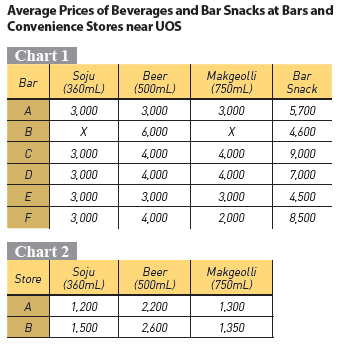
Benefit of Campus Drinking: Cheap Cost
Looking at Chart 1, there are six of the popular bars now in business near UOS, and it shows the average price of snacks and liquor of each. In the case of liquor, there is no price difference with soju. In striking contrast to other types of liquor, the difference in beer prices between the bars reveals a gap of up to 3,000 won. The average price of snacks ranges from 4,500 won to 9,000 won, and it differs in two ways.
If one orders a bottle of soju with bar snacks at the cheapest bar and does the same at the most expensive bar, one’s expenditure would range from 7,500 won to 12,000 won. In reality, one would be spending much more than estimated. The second chart shows the price of alcoholic beverages at the two convenience stores at UOS. It is obvious that the prices are noticeably lower than those of the bars, and onsidering the fact that common bar snacks from convenience stores, such as beef jerky, are cheap, one can assume that buying a drink and some snacks from the stores will not cost one more than 10,000 won at a time. Relating to these prices, Ha commented that when he has a drink near campus, it is common to have a drink or two, not drink until he is drunk. He thought it can be more efficient to buy at convenience stores than to go to the bars with their relatively higher prices. It was a common view of the interviewees that, although bars that are near the university are considerably cheaper than bars that are not, on campus they can enjoy drinking the cheapest.
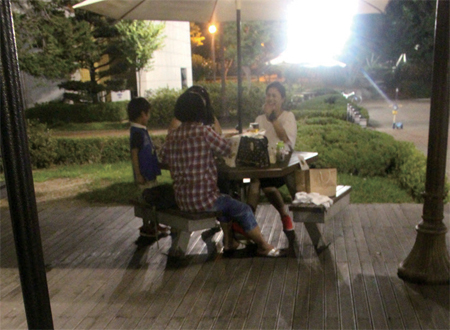
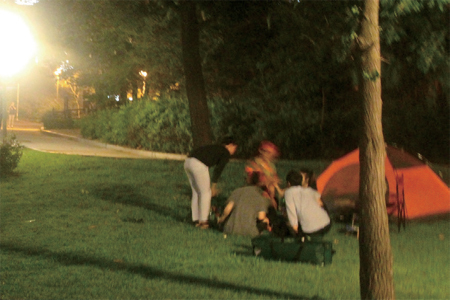
Voices about a Ban on Drinking
Looking at the interviews and surveys, one can ascertain that many of students have experienced drinking inside the school, and most showed a preference towards campus drinking because of its socializing functions and cheap costs. In that case, what do students think about the bill of MW, which directly affects them? As we mentioned above, a number of differing views on the new bill have arisen in society, and there are also many opinions at our university.
To start, when we asked the students what they think about the bill, 73 percent of them responded that it was a decision lacking consideration for actual circumstances and thus seemed unrealistic (see Survey E). Survey G shows that among 73 percent who disapproved of the new proposal, 46 percent thought banning drinking cannot be a fundamental measure for fixing drinking-related accidents and is nothing more than a temporary fix. They thought the drinking is just one of many other variables that can cause the accidents, and it is not reasonable to prohibit drinking by observing just the surface of the problem without getting to the core of it. The second-highest ranking answer was that it is a treatment which infringes the self-determination of the individual, and this accounted for 41 percent of responses.
On the other hand, half among the 8 percent of supporters who said it is imperative to enact the proposed bill reasoned that it is highly responsible for pollution on campus, and the other one fourth among them said the campus drinking cultures could distract students from their work or studies, creating a disordered atmosphere (See Survey E, F). In light of these opinions, we investigated further to find out what actually took place on UOS grounds at night.
To find out more about the issue of the campus environment, The UOS Times interviewed a woman janitor who is in charge of cleaning the school grounds, a job most closely related to the environmental problems mentioned by the students. As a matter of fact, contrary to some students’ belief, the janitor of UOS (who preferred to stay anonymous) showed a negative attitude towards prohibiting drinking on school grounds. This janitor told us that her working hours are from 5 a.m. to 4 p.m., so she and the other janitors do not know whether students or outsiders are mostly the ones drinking and littering.
They only see empty liquor bottles and boxes filled with leftover snacks. However, they assumed outsiders pollute the campus more often than UOS students: “UOS is very open to Seoul residents. Families visit UOS to go on picnics, children play around, and adults eat or drink. I believe it is them who do not tidy up after leaving. Garbage is discarded in large quantities on Mondays, collected during the weekends.” When asked if it is tough to clean up the mess from drinking, she answered that she does not think it is particularly hard on the school janitors, because their job is already cleaning and maintaining the school grounds. Nevertheless, she pointed out that broken bottles can be dangerous for both students and janitors and that, on many occasions, discarded pieces of food have attracted animals like stray cats. The cats dig up the food and scatter it around, which makes it all the more difficult to clean. All in all, it seemed that the janitor had negative opinions about outsiders drinking in campus.
On the other hand, she thought that drinking can have a good effect on students and spoke against the potential prohibition on drinking. “I think drinking on campus should not be banned. There are moments the students face hard times from life and need to talk to their friends while having a drink on campus. By doing so, they can improve relationships with their friends. In a way, I believe this is another form of studying. Totally prohibiting drinking inside the university campus can be hazardous for students.” Regarding creation of disordered atmosphere, although it was considered a problem by students, they were few in number. In addition, in a group interview among Yoon, Kim, and Shin, they all agreed that the academic atmosphere of UOS was not disturbed by campus drinking. Although the opinion was raised that if there were a problem, it would be the noise from drinking there were no precedent complaints caused by drinking, either.
There were also somewhat neutral views of the issue: disagreeing with the banning of alcohol on campus, yet demanding a limited allowance or more flexible prohibition.
“Limiting areas on campus available for drinking is a realistic and practical solution to problems caused by drinking on campus,” “Voluntary involvement of students in banning drinking is necessary to make it happen,” or “Placing campus keepers or private guards would be more effective than an unconditional objection to drinking on campus,” were the opinions of some of these students who responded to The UOS Times survey.
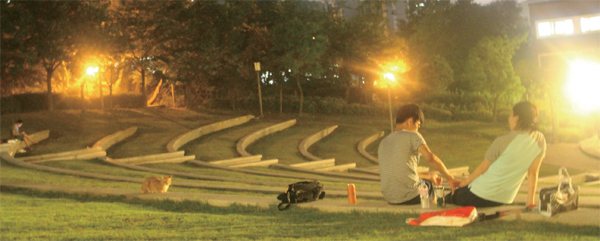
How to Truly Enjoy Campus Drinking
There were no serious problems compared to the concerns people had about the drawbacks of campus drinking in general. We cannot know who did not clean up the garbage after enjoying a few drinks. However, just like the janitor’s opinion, the problems were within a manageable range. The concern that drinking is the main cause of accidents does not seem like an issue either, because there were not serious problems brought to our attention.
Nevertheless, to form a desirable drinking culture without any problems in the future, we should try to make the current situation better than before. Students should voluntarily prevent possible accidents beforehand to keep the benefit of being able to drink on campus. For example, why not try to put broken bottle pieces in a plastic bag and lay it next to a trashcan? By doing simple acts such as these to put potential dangers aside, we expect that UOS students will be able to create a more pleasant environment for themselves.
We decided to examine the problem of atmosphere after receiving some reports that writings were posted to Gwangjang and SNS complaining of the noise caused by drunken students.
As a matter of fact, complaints were trivial and few; hence, it was impossible to jump to the conclusion that the noise hindered the students’ studies. Rather, we assumed that the ageing buildings and their outworn facilities could be the main cause of these noise problems. It has long been a complaint of students and faculty that the buildings at UOS have stood for too long without any maintenance. In addition to discussing many issues of the drinking and gathering students’ opinions, we would like to suggest some alternatives.
When considering in terms of the facilities, old buildings, such as Cheonnong Hall, the 2nd Engineering Building, and the Main Library, need to be maintained to minimize the noise made by drinking behavior. Prior to this, however, students themselves should strive to observe the drinking etiquette by establishing a sense of morals, and daily reminder of proper behaviors and notices around the university can help to improve student ethic.
Furthermore, through a flexible operation such as extending working hours of existing Campus Keepers system, we can prepare students to take preventive measures for incidents occurring in unmonitored blind spots. We hope that eventually these steps will lead to a sustainable drinking culture at UOS.
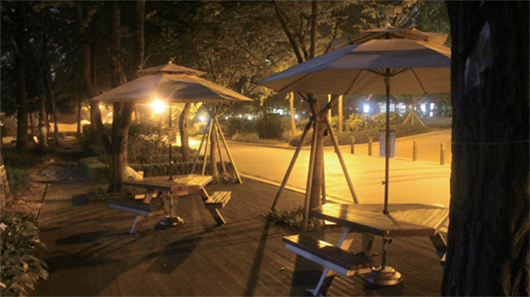
Many high school students dream of life on a university campus after graduation. One experience they long for must surely be a drink on the green campus. However, their dream is in the danger of never being achieved. There will be a considerable number of continuous oppositions against banning drinking on campus, and the actual enforcement of prohibition will face many trials and tribulations. Lawmakers ought to listen to the voices of university students who will be directly affected by the prohibition bill. By doing so, restrictive practices and flexibility in adapting to the current situation will lead to a positive response.
All photos credited by Lee Sang-yeop
Ham Seul-ki Reporter
hsk9409@uos.ac.kr
Lee Sang-yeop Junior Reporter
syl0616@uos.ac.kr

